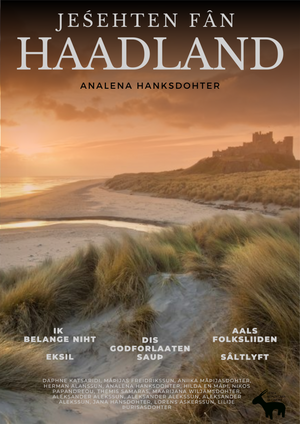Stories from Haadland
| Stories from Haadland | |
|---|---|
 Theatrical release poster | |
| Directed by | Analena Hanksdohter |
| Screenplay by | Daphne Katsaridi (Exile) Mâþijas Freidrikssun (Like Folk Songs) Aniika Mâþijasdohter (Salt Air) Herman Alanssun (This Godforsaken Mess) Analena Hanksdohter (I Don't Belong) |
| Starring | Nikos Papandreou Themis Samaras Maarijana Wiljâmsdohter Aleksander Alekssun Aksel Freissun Freidrik Jonssun Jana Hansdohter Lorens Askerssun Lilije Þurisasdohter |
| Music by | Hilda en Mâþi |
Release dates | 24 October 2022 (Montecara) 18 November 2022 (Azmara) |
Running time | 97 minutes |
| Country | Azmara |
| Language | Azmaran |
| Budget | €5 million |
Stories from Haadland (Azmaran: Jeśehten fân Haadland) is a 2022 Azmaran anthology film with elements of romance, drama and comedy consisting of five short films themed around the life of young people in the "outer Azmaran" province of Haadland.
The film marked the directorial debut of Analena Hanksdohter, who also wrote the semi-autobiographical fifth chapter of the film, I Don't Belong, with the other four chapters (Exile, Like Folk Songs, Salt Air and This Godforsaken Mess) being written by Daphne Katsaridi, Mâþijas Freidrikssun, Aniika Mâþijasdohter and Herman Alanssun respectively.
The film was premiered on the 24th October 2022 at the 83rd Montecara Film Festival and will receive a theatrical release in Azmara on 18 November 2022.
Plot
Exile
Ioannis "Yanis" and Katerina Stavridis move from Piraea to the Azmaran village of Kliftuun, Haadland in search of better economic opportunities. Opening a convenience store, the couple slowly adapt to the Azmaran way of life while Katerina learns she is pregnant. Yanis and Katerina increasingly adopt the Azmaran way of life while imparting knowledge of their Piraean customs on the local villagers, being the first non-Azmarans in the small village.
Like Folk Songs
Salt Air
Frei Johanssun, an introverted 17-year old from the small coastal town of Aawenmaþ, comes out as gay to his single mother, Stefanija over dinner. Initially shocked, Stefanija soon comes to accept Frei's identity. Meanwhile, Jorś and his family moved to Aawenmaþ from central Aalmsted after his civil servant father is assigned a job working for economic development in the region and the two run into each other in Jorś's first day at Aawenmaþ Gâlykskul. Immediately attracted to him, Frei is encouraged to pursue him by his childhood friend, Ana, yet Frei is distraught after seeing Jorś accept an offer of a date from a girl in his class, convinced he is heterosexual.
However, Frei comes to befriends Jorś when paired with him for a biology project and the two increasingly become close and share time together. On a visit to Jorś's house, Frei learns Jorś is bisexual yet was concerned about being public about his identity in rural Azmara, being concerned about the prospect of less accepting attitudes compared to his native Aalmsted. While Frei chastises Jorś and emphasises Haadland's historical legacy as a haven of political radicalism, the two embrace and decide to experiment with a romantic relationship, with the final scene of the chapter showing the two kiss on Aawenmaþ beach at a class barbecue.
This Godforsaken Mess
I Don't Belong
Freija Maþeisdohter, a confident young woman at the top of the intellectual and social pecking order at Heuthenberg Galukskoel, is accepted into the University of Aalmsted to study engineering. The only student accepted into the elite institution from her school, Freija is ecstatic. After seeing off her friends with a quiet party, Freija leaves behind Heuthenberg Docks to travel to Aalmsted Technical Institute.
While initially enthusiastic, Freija as a working-class woman from outer Azmara finds herself an outcast in the male and middle-class dominated Technical Institute and soon grows disenchanted with the party-oriented lifestyle of many of the Institute's students and finds their lack of concern about money and the plight of the country's working class disturbing as she takes on shifts as a waitress in a cocktail bar to cover her living expenses, and is incensed after being mocked at a social event for her IJssentaal-influenced accent.
Politically motivated by the experiences, Freija joins the Aalmsted Young Socialists and is initially relieved to socialise with like-minded individuals who share her concerns over gender and economic inequality yet ultimately finds the organisation's members little better than the engineering students she had grown disenchanted by, finding its members more interested in performative activism and largely ignorant of the true struggles of the country's working classes.
Depressed and isolated, Freija heads back home for the Nativity break and heads out for the evening with her friends from school in which she relays her experiences. While initially considering dropping out of university, seeing Heuthenberg as the only place she has truly belonged, she becomes inspired to work to make the country's elite universities a more accessible experience for people like her, with the film ending with her opening her laptop in her room in Heuthenberg ready to start her advocacy.
Cast
|
Exile
|
Like Folk Songs
|
Salt Air
|
This Godforsaken Mess
|
I Don't Belong
|